Investing in a goat or a herd of goats can seem overwhelming at first, but with the right information, you can be more than prepared to get the most goat for your money.
Just because a goat is priced high does not necessarily mean it is worth it and just because it is cheap, does not mean something is wrong with it.
Several factors determine the cost of a goat. It is important to know exactly what you are looking for so that you get your money’s worth. Age, breed, type, gender, as well as farmer circumstance all play vital roles in a goat’s purchase price.
There is no set price for what a goat should cost, but there is a basic consensus on what goats are going for in 2021.
Goats range in cost from $0 – over $2,000 depending on age, gender, quality, pedigree and performance. Male goats tend to be less expensive than female goats.
Knowing the typical cost for specific goats is vital to prevent you from paying too much for a goat and allowing you to spot deals quickly.
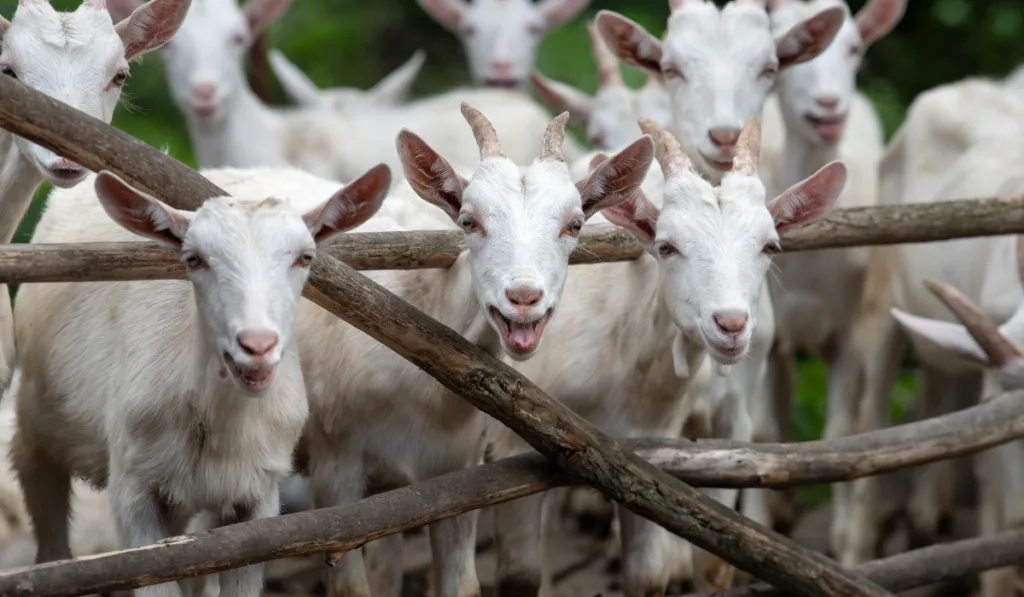
Table of Contents
Goat Price Ranges in the United States
Goat prices ranges can vary greatly throughout the United States, but for the most part, looking through Craigslist, most goats fall somewhere in the following table.
| Breed | Type | Unregistered Price Range | Registered Price Range |
| Boer | Meat, Show, Pet | $100-$350 | $300-$2000 |
| Nubian | Dual Purpose, Pet | $150-$200 | $300-$1000 |
| Alpine | Dairy | $150-$500 | $250-$500 |
| Nigerian Dwarf | Dairy, Pet | $100 – $350 | $300-$650 |
| Pygmy | Pet | $25-$250 | $175- $400 |
| La Mancha | Dairy | $200-$450 | $200-$600 |
| Saanen | Dairy | $35-$300 | $250-$550 |
| Kiko | Meat | $100-$300 | $200- $1,500 |
| Fainting Goat | Dual | $50- $300 | $150-$500 |
| Mixed Breed (Adult Male) | Dairy, Meat, Dual, Pet | $0-$300 | N/A |
| Mixed Breed (Adult Female) | Dairy, Meat, Dual, Pet | $0-$400 | N/A |
| Mixed Breed (Baby Male) | Dairy, Meat, Dual, Pet | $25-$150 | N/A |
| Mixed Breed (Baby Female) | Dairy, Meat, Dual, Pet | $50-$200 | N/A |
Types of Goats People Usually Buy
Dairy
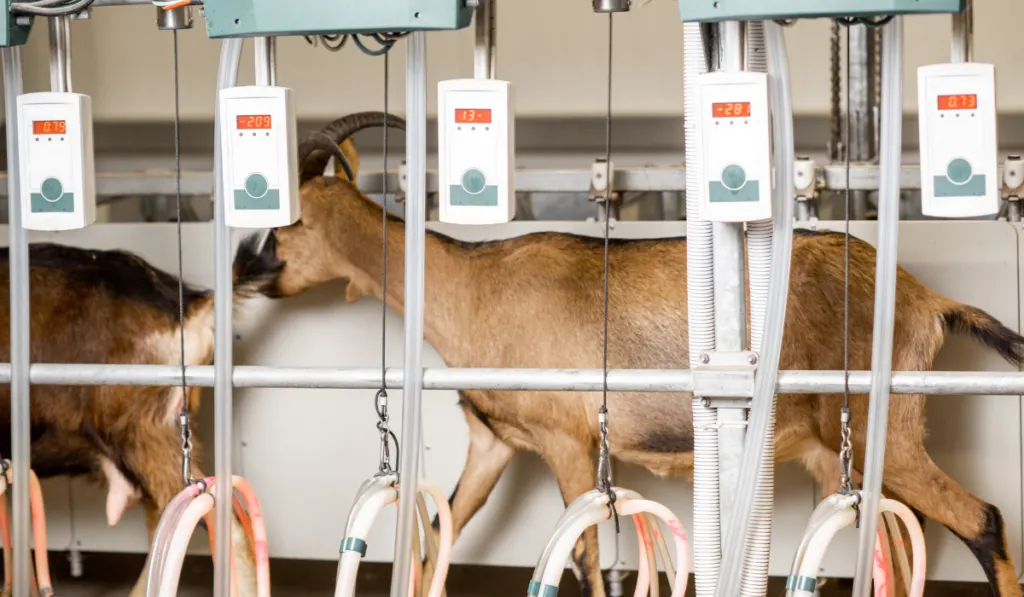
Dairy goats are goats that are specifically bred to be able to produce an above average amount of milk.
This means that they can not only produce an ample amount of milk for their offspring, but they also can produce milk for their owners as well.
Alpine, La Mancha, Nigerian Dwarf, and Saanen goats are all considered ideal dairy goat breeds.
Meat
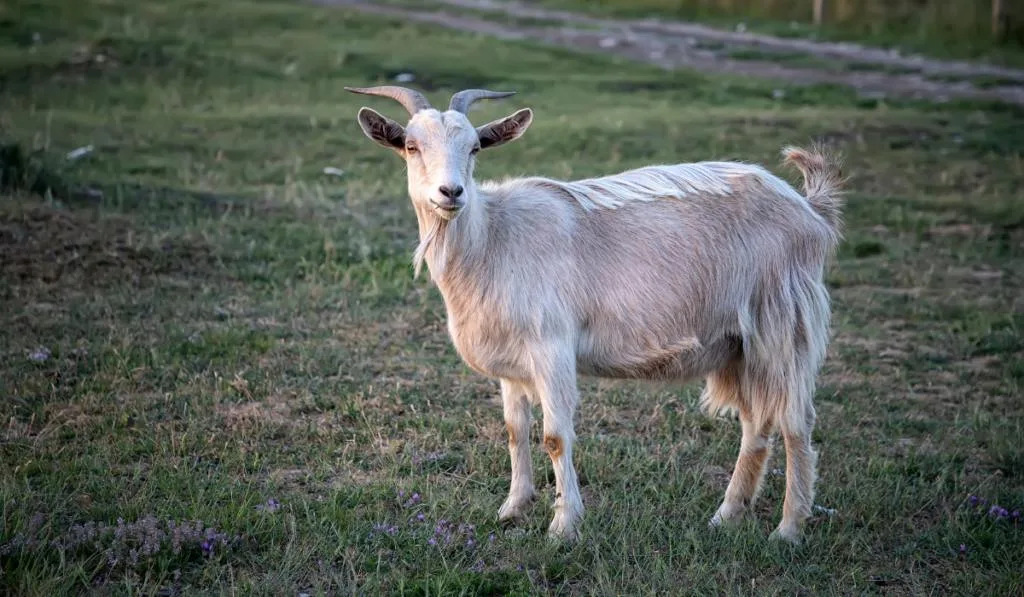
Meat goats are goats that are not ideal for milk production but are great for meat production. This means that they are raised and bred for their meat and are not milked by farmers throughout the year.
Not all meat goat owners intend on harvesting their goats for meat, that is just how they are referred to since they are not great milk producers.
Breeds like the Boer, Kiko, Pygmy, and fainting goats are all considered meat goats.
Dual-Purpose
Dual-purpose goats can produce adequate amount of milk for farmers and can perform well as meat goats. Nubian goats are considered dual-purpose goats, used for both meat and dairy production by farmers. Mixed breed goats, depend on the breeds involved, often fall under this category.
Show
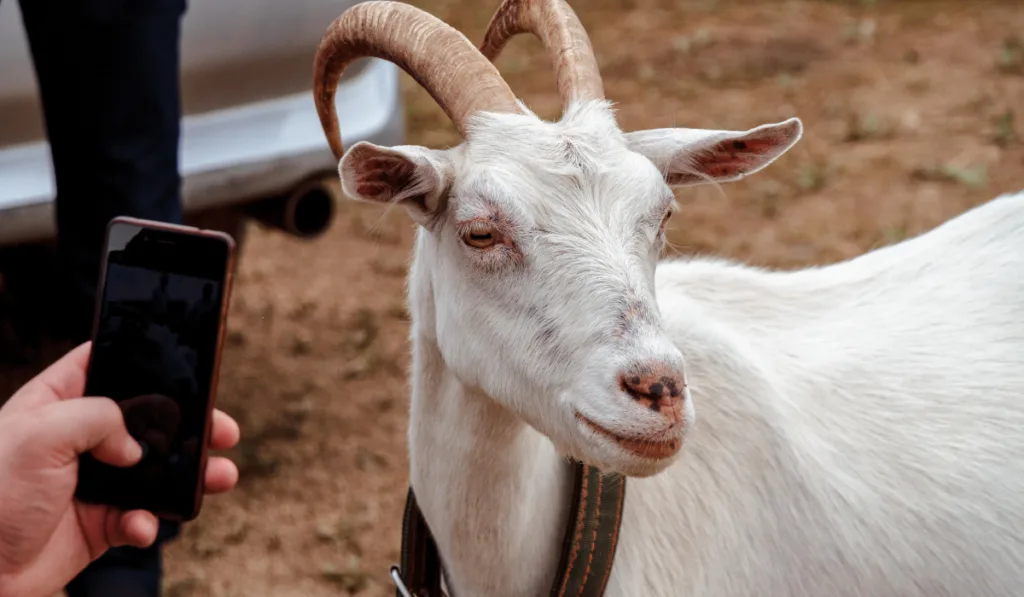
Show goats are those that are bred and most often registered for their proven ability to perform in goat and livestock shows. They can also be meat or dairy goats, but they are mainly intended for show competitions.
These goats will be registered with the ADGA, the American Dairy Goat Association, or the American Goat Society, or other breed specific registries.
Show quality goats typically cost a lot more than other types of goats due to their proven bloodlines and ability to compete as well as their potential to produce income by yielding offspring.
Pet
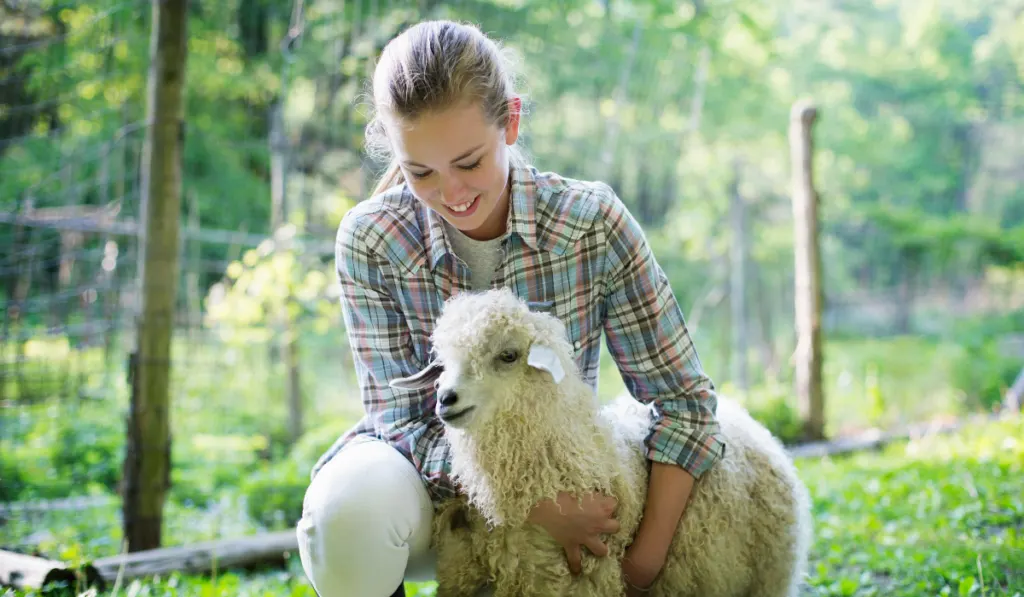
Goats that are advertised as pets are those that are intended to be companion animals and pets. They can be dairy, meat, dual-purpose, or unregistered purebred goats. Pet goats are great additions to any farm, even if goats are not the main focus.
Almost any breed of goat can make great pets and companion animals on a farm. Pet goats usually are cheaper than goats that are intended for milk or meat production and significantly cheaper than registered show goats.
Check out our post on goat breeds for more information on specific breeds of goats and what they are used for.
Other Factors that May Affect the Price of a Goat
Registered Purebred vs. Non-registered Mixed Breed
Registered purebred goats are those that are registered with a national goat registry to verify their bloodlines. Anyone can say they have a purebred goat, but the only real proof are registry papers that prove lineage.
Purebred goats are a single specific breed and are not the product of two separate breeds. Purebred goats can range in price from $200 to upwards of $2,000 or more in some circumstances!
Mixed breed goats are not able to be registered because they are the product of two or more different goat breeds. There is no proof or tracked history of their ancestry. Besides their appearance, only a blood test would let you know exactly what breeds are in their lineage.
Mixed breed goats tend to live longer lives and are more hardy than some purebreds, or at least that has been my experience. Mixed breed goats can range from free in certain circumstances to a couple hundred dollars depending on other factors.
Female vs. Male
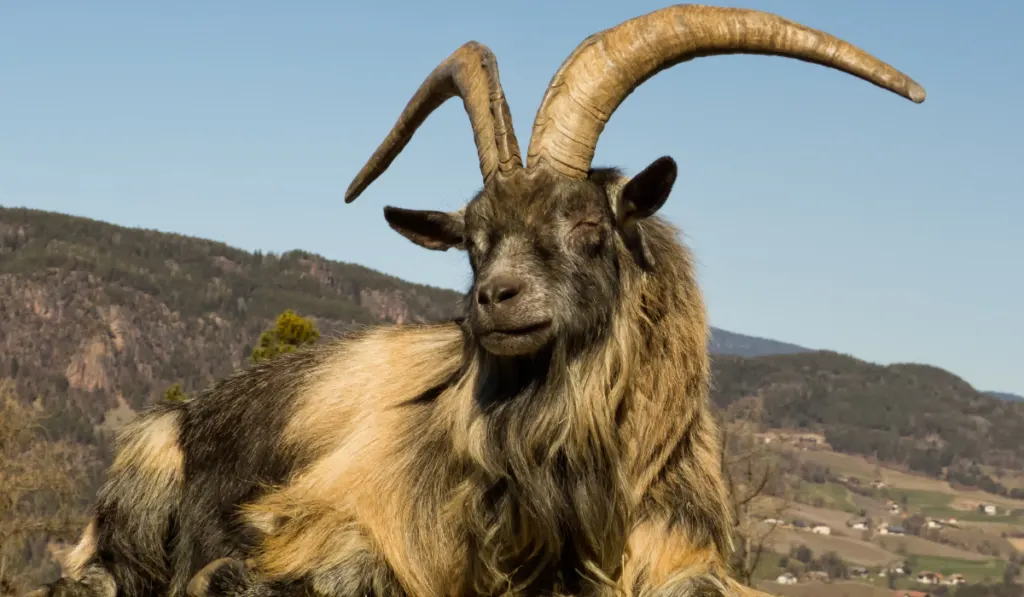
Female goats usually cost more than their male counterparts because of their ability to produce offspring. They are also harder to find for sale, as many goat farms keep all or the best does their farm produces. This creates a high market demand with limited supply, so farmers understandably ask more for them.
Male goats cost less than females for a couple reasons. Most farms only need one or two intact males, called billy goats, on their property due to the potential of fighting, so demand is low.
Many small goats farms either sell or castrate all male goats their does produce if they do not intend on using them for breeding. This creates an excess of male goats available on the market, which lessens their monetary value.
Quality
The quality of a goat plays a large role in the pricing. A good quality goat will be healthy, well-fed, with a good-looking coat and skin. They will have no visible injuries and will come from hardy stock. High-quality goats, regardless of their breeding, will cost more than those of a lesser quality.
Low quality goats are those that are sickly looking and may need a lot of extra care. Their coats will look poor and they may not move around with ease. Beware of purchasing low-quality goats and always take them to a veterinarian first to rule out disease or parasites before you introduce them to other goats on your farm.
Age
Age is a big factor in the initial price of a goat. Young newborn goats that will need to be bottle-fed will cost less than those that have been weaned off of milk. Selling the goat as a newborn saves the owner money, while it costs the buyer in time and money.
Older goats that are past their prime and possibly unable to breed will be cheaper than younger goats. Goats that are just entering their breeding age, around 1.5 to 2 years old, will cost the most.
Breed
Different breeds can cost different amounts depending on the availability of the goat breed in your area, as well as what it offers.
Boer goats are probably the most popular and can cost the most if they are registered, female, and high-quality.
Pygmy and Nigerian dwarf goats tend to be a little cheaper due to their smaller size.
Pregnant at Purchase
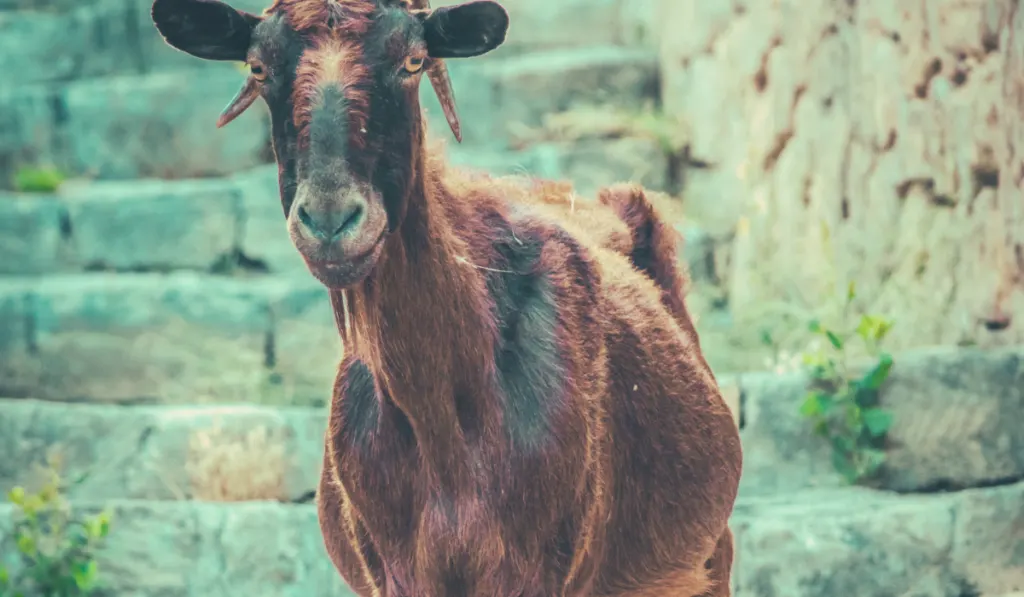
Pregnant does, or female goats, are worth a lot more than non-pregnant does since you are basically getting a two-for-one deal, or maybe more if she happens to be carrying twins.
Pregnant does should either have a veterinarian’s confirmation of pregnancy or be noticeably pregnant. If you are paying extra for the pair, you want to be sure it exists at the time of purchase.
Castrated/Wether Goats
Male goats that have been castrated are called wethers and their cost varies greatly.
Castrated goats are male goats that have had their reproductive abilities removed. They usually cost a little more than a very young intact male goat because it is a convenience for the buyer for them to be castrated early.
Not all farmers charge extra for castration, however, especially if the goats are very young. Wethers will cost less than an intact buck or billy goat that is being sold for its breeding abilities.
In Milk Production
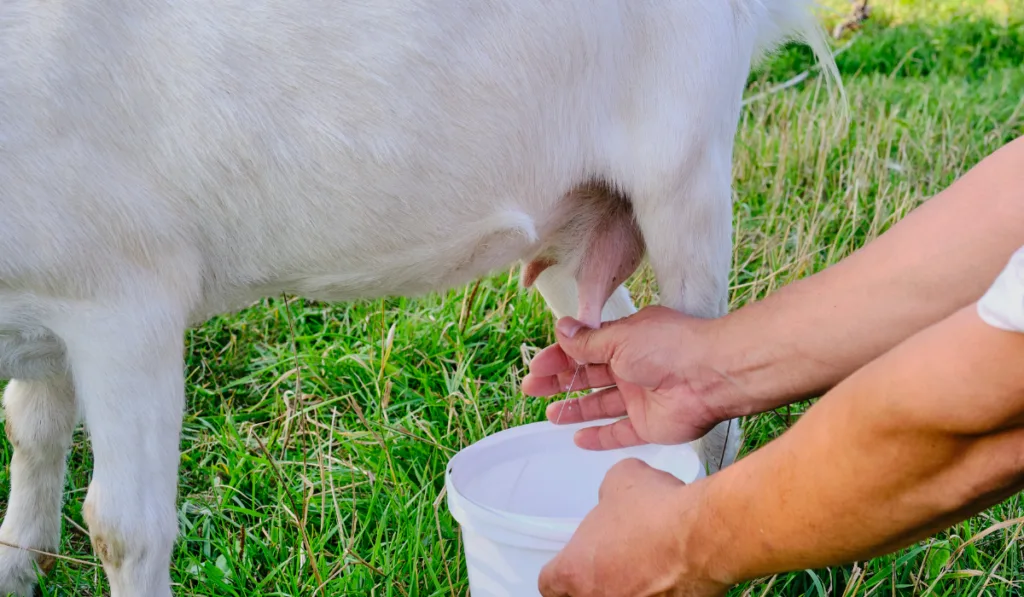
Female goats that are currently ‘in milk’ production at the time they are sold are priced higher than those that are not.
This means they are actively producing milk so buyers will be collecting milk from them on their farm the day that they bring them home.
The only way to bring a goat into milk production is to have it bred, wait for them to give birth, and only then will they be actively producing milk.
Buying a dairy goat that is “in milk” saves substantial time and money if milk production is your ultimate goal.
Appearance
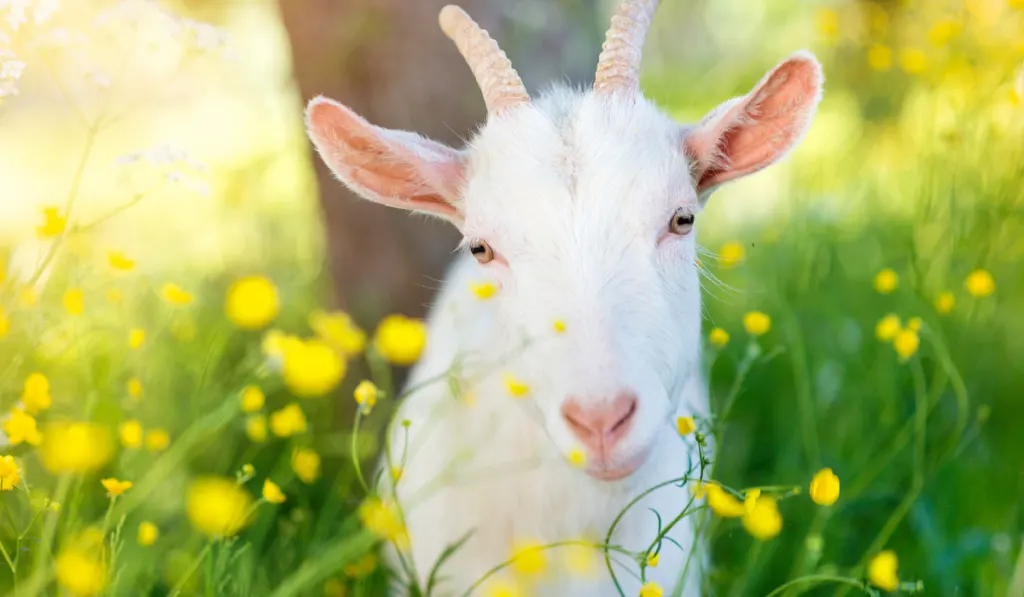
While coat and eye color have no bearing on the abilities or health of a goat, it does play an important part in the cost of a goat. Goats that have unique patterns such as ‘moonspots’ often cost more than those without.
Coats that have multiple colors, including black, white, brown, cream, or gray often cost more than solid colored goats.
Goats that have blue eyes are more desired by farmers, so they typically cost more regardless of their coat colors.
Final Thoughts
Goat prices in the United States depend on many factors that may or may not be important for you as the buyer. It is important to first figure out exactly what you are looking for in a goat or herd of goats before you start buying. Knowing exactly what kind of goat you need will help you get your full money’s worth and help to steer clear of overpricing.

Sherry Lucas
Friday 29th of April 2022
I’m looking at buying a couple month old boer goats. They are registered but I’m mainly wanting for meat production for family use. Can I ask them to hold papers and get at lower cost? What would be a good cost with/without papers?
April Lee
Saturday 11th of June 2022
You can always ask them to hold papers but many breeders may not want to, especially if they have other buyers willing to pay full price for their purebred animals. The price ranges on here were attained from looking at sites like Craigslist as well as farming groups, but actual prices will vary from area to area.
Another way to find low cost goats is to look at auctions instead of private breeders. Typically these animals come from higher homes but have owners looking to sell them as soon as possible. Of course, what you pay at auction depends on who you are bidding against so its good to know local prices.
Brady
Monday 14th of March 2022
This was very helpful !
Sameer Hijaz
Saturday 1st of January 2022
I’m interested in milk producing bread Which bread acclimates better in the Midwest
Amber haney
Tuesday 4th of January 2022
@Sameer Hijaz, Nigerian dwarf goats are good milk goats
Glengie Cuevas Nunez
Sunday 21st of November 2021
How much a blue eyes goat cost?
Amber haney
Tuesday 4th of January 2022
@Glengie Cuevas Nunez, $275 is what I got for my 2 kids each. Nigerian blue eye dwarf goats. You can get up to $300
Mike
Thursday 10th of June 2021
Very informative article thank you so much I still have a lot of research to do but that was very helpful.